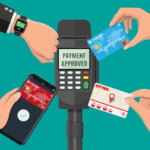The cashless society – A UK perspective

The idea of the cashless society has long been a staple of Utopian science fiction, a kind of paradisal conquering of the old Biblical idea that money – or the love of money, for the purists – is the root of all evil.
But, like many other science fiction concepts – robot warehouses, a connected network of all human information, communication devices that can unite us all over the world from the palm of our hand – the potential for a cashless society to cross the line into our reality has never been closer than it is right now.
Several countries around the world, including Norway, Sweden, Brazil and most significantly by far, China, are becoming early adopters of the cashless society – or at least the cash-minimum society, as the electronic transfer of numbers in digital data vaults pushes “cash” ever further towards being an entirely theoretical concept, increasingly divorced from the reality of wads of notes and pocketfuls of toll change. Across Europe now, the World Economic Forum claims that only 28% of people say cash is their “favorite” way to get their transactions done.
The upsides of going cash-free.
Other countries, like the US and the UK, have been significantly slower to adopt the technologies that make a cashless society a realistic possibility. We sat down with Martin Bradbury, Regional Director, Financial Services UK & Ireland at Dynatrace, a cloud provider that enables digital services for commercial clients (including providers of cashless transactions), to explore the state of the cashless society in the UK (a country which famously refused to change its own longstanding currency to the Euro while it was a member of the European Union, maintaining the difficulties of cash-based travel to the country).
The UK is a country that’s further down the cashless line than, say, the US, so it acts as a useful case study, somewhere between the early adopters and the latecomers. As such, our first question to Martin seemed essential.
THQ:
What are the arguments in favor of going towards the cashless society? And what are the benefits it’s supposed to bring?
MB:
There are a few to consider. First of all, there’s obvious traceability around digital transactions that simply doesn’t exist in cash. That means cash is connected to a significant element of criminal activity, specifically because it’s harder to trace.
There are associated benefits in terms of simplifying foreign travel, too – digital payments have made that experience a lot easier for the vast majority of people that travel internationally. So there’s a simplicity and convenience argument of always being able to pay for what you need, when you need it with digital means.
There’s a cost saving argument as well, in terms of the logistics of maintaining the cash infrastructure. The ATM infrastructure in the UK runs to around £5 billion a year just to maintain, and that’s largely borne by the banks, so clearly, the closer the UK gets to being a cashless society, the easier the banks will sleep. The longer the ATM infrastructure has to be maintained, the more it becomes a cost that looks disproportionate to the usage of those facilities. So there are some strong arguments, for sure.
THQ:
But we can have all those benefits within a mixed economy including cash, can’t we, rather than going particularly cashless? Apart from the ATM infrastructure costs, which would disappear.
MB:
We can, largely, yes. Today in the UK, around 15% of payments, in terms of transaction volume, are made through cash. The forecast is for that to be more like 6% within the next ten years. So that, broadly speaking, puts the UK around ten years behind the early adopters on the cashless trajectory. Countries like Norway have obviously been the leading lights in this area for a while.
The consumer trust balance.
There are interesting lessons to learn, though. I wouldn’t call the UK a fast follower in this area, though a follower, certainly. In Norway last year, there was quite a major payments infrastructure outage ahead of a public holiday. So hopefully, we don’t get that today or tomorrow here [ahead of the coronation of Charles III, and the public holiday that follows that event].
But there’s a big consumer trust issue that was created by that outage. And in response to that, the Norwegian government is actually increasing some of the consumer protection around an inability to pay with cash. So I think, if we learn from that experiment, we can say that the future probably won’t be entirely cashless. But it will be a society that’s significantly less dependent on cash than the one with which we’re familiar. And, keeping that reducing percentage in mind, we’ll use less cash over time. But I very much doubt that cash is going to go away in the foreseeable future, at least in the UK.
THQ:
We were going to raise similar edge cases like tourist towns, rural villages and the like. Increasingly, banks are closing down their branch networks, so often there will only be ATMs and maybe a post office, and then come a public holiday or a holiday season, the ATMs will break down with a reliability that’s like clockwork, so that sort of infrastructure outage you mentioned from the Norwegian example resonates.
Special factors?
That raises the further question of why some countries have been quicker to adopt this pathway to a cashless society than others. Are there peculiarities in some economies that allow the journey towards cashlessness to be a faster thing in some countries? Is the UK inherently more circumspect about it, or is it just not up to speed with the likes of Norway?
MB:
I’m not sure there’s a key difference between cases. The governments in the early-adopting countries simply grabbed the initiative and ran with it. I don’t think that’s something the UK government wants to do. In fact, in its recent Financial Services and Markets Bill, the UK government actually makes similar provisions to Norway in terms of protecting the access to pay in and withdraw cash, and making sure that that infrastructure is in place. Of course, that only goes so far – if you can’t actually do anything with cash once you’ve withdrawn it, then it’s a fruitless effort.
That was debated in parliament this year, the question of whether specific legislation should be introduced to mandate the acceptance of cash, because we’ve seen certain outlets reduce their acceptance of cash in the post-Covid era.
I don’t think the government at this point is going to go that far. But some of what happens and how fast it happens is down to the mandate from the government, and some of it is down to recognition of the minority groups that this affects most – because moving away from cash does create an issue around financial inclusion.
And actually, there are several groups that are disproportionately impacted by the shift. It’s not just the elderly, which is a classic use case. It’s also the 1.2 million people that are unbanked in the UK. 90% of that unbanked population is below the poverty line, and has arguably already been left behind by society. So anything that increases that gulf of inclusion is not welcome, I don’t think.
A political hand grenade?
THQ:
We know there are technical arguments in favor of moving towards a cashless society in the UK. Are there any political points to be won by being the government that pushes it forward?
MB:
I would probably say the opposite, if I’m brutally honest. I think actually that it would have a detrimental effect if the government were deemed to be pushing hard for a cashless society in the UK. There’s still a very significant portion of the electorate that would be negatively impacted by that.
Statistically speaking, there are about 10 million people in the UK that would be very severely impacted by a removal of cash. And I think that while, interestingly, there’s a much bigger percentage of people that say they very rarely use cash, people still want the ability to use it. People get a comfort factor from having some cash in their pocket as a backstop.
And, as with the Norwegian example, we all had a payment card outage in the UK a few years ago, and that was a big deal. It affected everyone and their ability to pay for the essentials of life – gas for their cars, a pint at the pub [It is the UK, after all…], anything that was deemed critical. For a few hours, it was impossible to buy those things, and that was shocking.
THQ:
We’re just thinking – at the moment, the UK has a more right-wing government that has been in power for a long time and has championed increasing freeing of financial markets and that kind of thing.
If that government can’t win political points from pushing for a cashless society, there will presumably be no political points in it for any more left-wing government that follows it. So in a way, the cashless society hits its own drag factor in terms of political mandate in the UK, doesn’t it?
MB:
Correct. I mean, potentially you could campaign for it as a method of tackling tax evasion, because it probably would be better on that than a society which includes cash – again, it’s that traceability of transaction – but I don’t think any party will ever campaign on that basis.
In Part 2 of this article, we’ll delve deeper into consumer trust – and distrust – as a defining factor on the road to a cashless society, and who needs to do more to empower the drift towards that kind of future.










